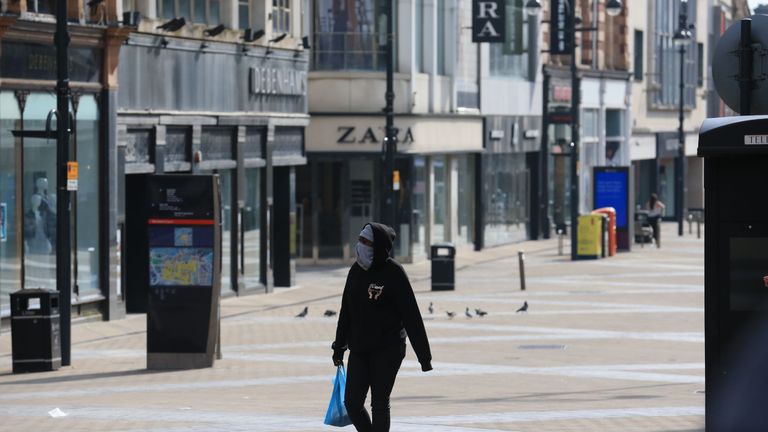Coronavirus: London added to COVID-19 watchlist - as more cities on tighter lockdowns
Mayor Sadiq Khan says the capital is at a "very worrying tipping point".
Friday 25 September 2020 19:16, UK
London has been added to the national coronavirus watchlist, while more areas in England and Wales are heading for new restrictions from this weekend.
Leeds, Blackpool, Wigan and Stockport will see tightened restrictions from Saturday, Matt Hancock has announced.
Meanwhile, Cardiff and Swansea will go into local lockdown from 6pm on Sunday, the Welsh government has confirmed, while the town of Llanelli will do the same at 6pm on Saturday.
Live updates on coronavirus from UK and around the world
A statement from the health secretary said: "The latest data shows a sharp increase in incidence rates per 100,000 population in Leeds, Blackpool, Wigan and Stockport, which are significantly above the national average.
"As a result, we are making regulations which take effect from Saturday 26 September and will impose restrictions on inter-household mixing in private dwellings and gardens in Leeds, Stockport, Wigan and Blackpool.
"This is in line with measures seen elsewhere in the country, such as Leicester and the West Midlands.
"People who live in these areas will not be allowed to gather in a private dwelling or garden with any other household unless in a support bubble.
"People from anywhere else will also not be allowed to gather with another household in a private dwelling or garden in these areas."
London Councils, which represents the capital's 32 boroughs and the City of London, revealed the city was being made an "area of concern".
While no additional measures are being taken in London at the moment, testing capacity is being boosted to closely monitor the spread of coronavirus.
Local councils with higher infection rates are placed into three categories; "areas of concern", "areas of enhanced support" or "areas of intervention".
Tougher restrictions are normally brought in when areas are placed in the third category.
London Councils said: "It is a stark reminder that now is time for all Londoners to pull together and take action to keep themselves, their families and their communities safe, and to ensure that London's economy is protected."
The mayor of London, Sadiq Khan, said: "London is at a very worrying tipping point right now."
On the importance of testing, the Labour politician added: "It's vital that testing capacity is increased immediately in London and focused in the areas it is needed most.
"Any delay will mean letting the city down and will cost lives."
London Councils added: "It is welcome that the city's testing capacity is boosted so that Londoners have timely access to COVID-19 tests and the government must ensure that this is sustained from now on."
The statements from London Councils and Mr Khan come less than a week after modelling suggested the capital was only two or three days behind virus hotspots in the North West and North East.
Londoners have been urged to abide by the new restrictions set out by Boris Johnson at the start of the week - including working from home where possible and keeping to the rule of six.
Speaking on Friday, the mayor pointed to a lack of testing capacity in the capital as the reason why it had become an area of concern.
Mr Khan said: "The near collapse of test and trace and the resurgence of the virus means new measures to slow its spread were absolutely necessary.
"Testing capacity was diverted away from London in the last two weeks to other national hot spots and weekly testing numbers are now down 43% in the capital since mid-August.
"The lack of testing capacity is totally unacceptable and it is why London has been added to the government's coronavirus watchlist as an area of concern."
In Cardiff and Swansea, people will not be able to enter or leave the areas without a reasonable excuse. They will not be able to meet indoors with anyone they do not live with, with extended households suspended.
People must work from home when possible, health minister Vaughan Gething told a press conference in Cardiff.
He also urged people not to have a "big blowout" over the weekend before the restrictions come into force, saying: "Introducing restrictions in any parts of Wales is always an incredibly difficult decision for us to make.
"Having to introduce these restrictions in our biggest cities - including our capital - is another sombre milestone in a difficult year."
Llanelli will go into lockdown as transmission of the virus is said to have become "concentrated" there.
On Thursday, there were 25 new cases in Carmarthenshire, 39 in Cardiff and 41 in Swansea.
The measures in Blackpool will see its restrictions come in line with the rest of Lancashire.
The restrictions in Stockport are being reimposed after mixing between households was allowed on 2 September.
The estimates that Wales' infections overall have risen seven-fold, going from 1,500 to 10,800 - and equating to one in 300 people.
And more than 103,000 people in England are estimated to have had coronavirus in the week ending 19 September, according to the data.
The rate of transmission across the UK is now thought to be between 1.2 and 1.5 - another rise on last week.






